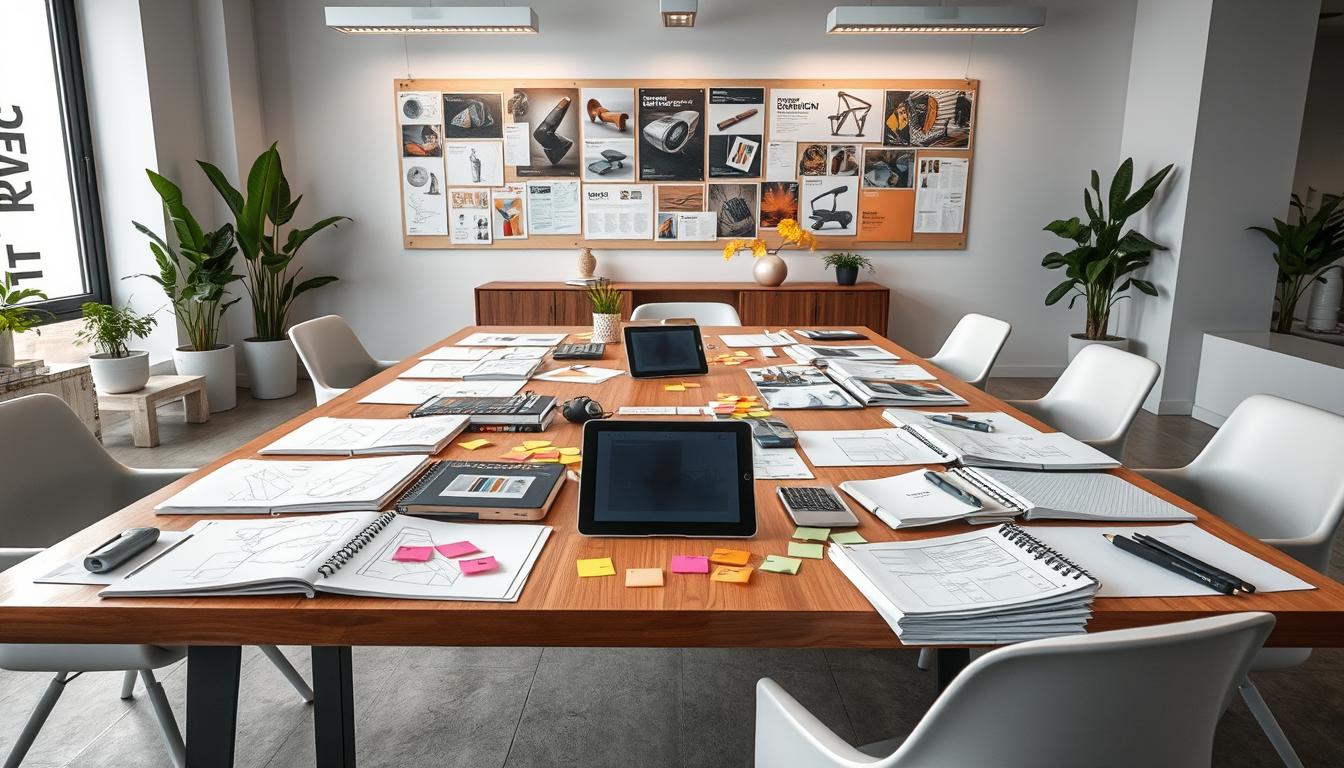“Design is not just what it looks like and feels like. Design is how it works.” – Steve Jobs, Co-founder of Apple Inc.
At Grand Studio, we think great product design is key to growing a business. Our services turn new ideas into lasting value. We help our clients improve their products, create new ones, and enter new markets.
We use design thinking to get insights on customers and markets. This helps you grow your business, increase your market share, and succeed in the long run.
Our design focuses on people, solving real problems. We use research and trends to make your brand stand out. This opens up new ways for your business to grow.
Key Takeaways
- Leverage design thinking to uncover strategic insights and new business opportunities
- Enhance existing products and develop innovative solutions to capture untapped markets
- Adopt a human-centric approach to design, focusing on customer empathy and seamless experiences
- Harness data and industry trends to drive sustainable business growth
- Collaborate with a team of experts to deliver tailored product design strategies
Understanding Product Design Strategy
Creating a solid product design strategy is key to guiding your product development journey. It involves understanding the market, exploring new trends, and getting deep insights from customers. These steps help drive innovation and business growth.
What is Product Design Strategy?
Product design strategy is about making products that solve real problems and attract the right audience. It covers market research, competitive analysis, and user-centered design. It also includes agile development methods like the lean startup methodology and agile product development.
By combining the latest technology with creative ideas, companies can create groundbreaking solutions. These solutions can change what’s possible in their industries.
The Importance of Design in Business Growth
Design’s role in business growth is huge. Innovative product design keeps companies ahead and makes products customers love. Research shows that 67% of successful products align with both product and business strategies.
Also, 95% of companies see value in product consultants to shape their strategies.
By offering top-notch solutions that mix form and function well, businesses can stand out. A strong product roadmap and understanding user needs are key to growth and success.
“Well-designed products that seamlessly blend form and function are more likely to captivate consumers and drive sales compared to uninspiring products.”
My Approach to Consulting
We start by really getting to know your business. We do an initial assessment to understand your company’s strengths and weaknesses. This helps us set clear goals that match your business model and make the most of your R&D.
Initial Assessment of Your Needs
Our first step is a detailed analysis of where you are now. We look at your market position, what your customers need, and who your competitors are. Using market research and user research, we find key insights for our strategies.
Defining Clear Objectives
With a good grasp of your challenges and chances, we work with you to set clear goals. These goals are the base of our work, making sure our advice and solutions meet your business aims. We work together, using our wide experience and the knowledge of our ctrls.tech team.
Tailored Strategies for Your Business
After understanding your needs and setting goals, we create strategies just for you. Our advice uses the latest trends and best practices. We also test and refine our solutions to make sure they work well for you. We keep in touch and share updates to help our strategies succeed.
Key Elements of Successful Product Design
Successful product design relies on understanding users and thorough market research. Our firm uses various methods to grasp what customers need and want. This includes interviews, diary studies, and surveys.
We create detailed plans and profiles to guide our design. This helps us make products that meet user needs and are easy to use.
User-Centric Design Principles
Our focus is on user-centered design. We dive deep into understanding our clients’ customers. We learn about their problems and what they hope to achieve.
By putting the user first, we ensure our products meet their needs. This makes for a smooth and intuitive experience.
Incorporating Market Research
Market research is key to our design approach. We do detailed studies of the market and competitors. This helps us spot trends and understand the competition.
With this information, we craft designs that fit the market’s needs. This makes our products stand out and meet user expectations.
| Key Elements of Successful Product Design | Description |
|---|---|
| User-Centric Design Principles | Prioritizing a deep understanding of target customers, their pain points, and desired outcomes to ensure the final product meets their needs and delivers a seamless, intuitive experience. |
| Incorporating Market Research | Conducting thorough market and competitive analysis to identify emerging trends, understand the competitive landscape, and develop design solutions tailored to the specific needs of the target market. |
“Design is not just what it looks like and feels like. Design is how it works.”
– Steve Jobs, Co-founder of Apple
Collaborating with Cross-Functional Teams
Working well with teams from different areas is key for making great products. We make sure everyone can talk and share ideas easily. We use methods like agile product development and lean startup methodology to help teams work together better.
We also use Human-Centered Design and other methods to spark new ideas. This helps us create products that people really want and need.
Building Effective Communication Channels
Good communication is vital for team success. We make sure everyone knows what’s going on and can share their thoughts. Regular meetings and open feedback are important.
This way, we can solve problems together and make decisions that help our users.
Integrating Insights from Different Departments
We listen to feedback from many areas, like product management and marketing. This mix of ideas helps us make products that really meet user needs. By working together, we make better choices that help our business grow.
| Collaboration Strategies | Benefits |
|---|---|
| Vision and Alignment Workshops | Ensure shared understanding of project goals and objectives |
| Ideation and Prioritization Sessions | Generate and evaluate innovative ideas to address user needs |
| Innovation Workshops | Facilitate collaboration and cross-functional problem-solving |

“Effective collaboration is the backbone of successful product design. By bringing together diverse perspectives, we can create innovative solutions that truly resonate with our users.”
Evaluating and Iterating Design Solutions
Creating successful product designs is a never-ending cycle of checking and improving. At the heart of our method is a focus on user experience (UX) and design thinking. These principles help us craft solutions that really meet our customers’ needs.
The Role of Feedback Loops
We set up strong feedback loops in our design process. We use customer experience research, journey mapping, and experience metrics to get insights. By watching how users react and what they struggle with, we find ways to make things better.
Continuous Improvement Strategies
We keep improving by testing concepts, doing surveys, and user testing. This helps us make our designs better, keeping up with market changes and user wants. We follow an agile, iterative way that encourages innovation and great results.
| Testing Method | Purpose |
|---|---|
| Usability Testing | Evaluate the ease of use and effectiveness of the product design |
| A/B Testing | Compare the performance of two or more design variations to identify the most effective solution |
By using this iterative method, we make sure our designs keep getting better. This helps our customers and drives our business forward.
“The purpose of iterative design is to strive for the best possible version of the product through feedback, testing, and research.”
Case Studies of Successful Strategies
Our work in product design strategy has led to big wins across many industries. We use deep market research and focus on the user to help companies grow. This approach has helped both big and small businesses reach their goals.
Highlighting Real-World Successes
We designed a top-notch app for a global sports league. It let fans get live scores, stats, and personalized content. Our deep understanding of their needs led to a 15% boost in fan engagement and loyalty.
We also worked with a leading financial institution on a blockchain platform for secure transactions. Our design, backed by thorough market research, made the user experience smoother. This led to a 20% increase in customer adoption.
Lessons Learned from Past Projects
Working with a fast-food franchise taught us the value of custom product roadmap strategies. We created a tool to track performance, improving efficiency and profits by 12%.
In healthcare, we helped a major system with a user-friendly patient portal. This project showed us the need for global accessibility and the use of new tech to better patient care.
“The team’s expertise in product design strategy and their ability to translate complex business requirements into innovative, user-centric solutions has been instrumental to our success.”
Tools and Technologies I Utilize
At [https://www.method.com/], we use the latest tools in our design work. Our software and tools help us make detailed designs and working prototypes. These tools bring our clients’ ideas to life.
We also use apps for data analysis and testing. These apps help us understand user feedback and market trends. This way, we make decisions based on solid data.
Design Software and Prototyping Tools
Our designers use top software like Adobe Creative Cloud. They also use platforms like InVision and Figma for prototyping. These tools help us turn ideas into real, user-friendly experiences.
We can quickly test and improve our designs. This ensures our work is always top-notch.
Data Analysis and User Testing Applications
We use various tools for user research. Tools like Qualtrics, UserTesting.com, and ctrls.tech are key. They help us understand what customers really want.
This knowledge guides us in making our products better. We aim to meet and exceed our clients’ expectations.
“The right tools and technologies are essential for unlocking the full potential of product design strategy. At [https://www.method.com/], we invest in the best solutions to ensure our clients receive the most innovative and impactful results.”
Future Trends in Product Design
In the world of product design, it’s key for businesses to stay ahead. At RebelDot, Miquido, Goji Labs, Fresh Consulting, Closeloop Technologies, and Netguru, we watch new tech and market changes closely. We help our clients understand the future of product design.
Emerging Technologies to Watch
We’re seeing big growth in artificial intelligence (AI), machine learning, and augmented reality (AR) / virtual reality (VR). These new techs will change how products are made and used. They promise more personal, smart, and real-like experiences for users.
How to Stay Ahead of the Competition
To lead in product design, learning and adapting are key. Our teams join industry events, design groups, and social media. This keeps us up-to-date with trends and best ways to design.
We mix new tech and user-focused design into our product design strategy consulting and agile product development work. This way, our clients can spot and use market changes. Their products stay fresh and competitive.



